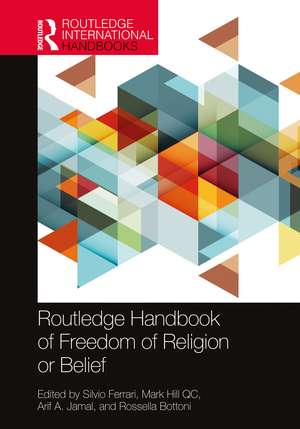Routledge Handbook of Freedom of Religion or Belief: Routledge Handbooks in Law
Autor Silvio Ferrarien Limba Engleză Paperback – aug 2022
Global, historical and interdisciplinary in approach, this book studies the new relevance of freedom of religion worldwide and develops suitable categories to analyze and understand the role that freedom of religion can play in managing religious and cultural diversity in our societies. Authored by experts, through the contributions collected in these chapters, scholars and students will be able to broaden and deepen their knowledge of the right to freedom of religion and to develop the ability to go beyond the borders of the different cultural environments in which this right took shape and developed.
Preț: 300.56 lei
Preț vechi: 342.08 lei
-12% Nou
57.51€ • 60.21$ • 47.59£
Carte tipărită la comandă
Livrare economică 05-19 aprilie
Specificații
ISBN-10: 0367634430
Pagini: 292
Dimensiuni: 174 x 246 x 16 mm
Greutate: 0.5 kg
Ediția:1
Editura: Taylor & Francis
Colecția Routledge
Seria Routledge Handbooks in Law
Locul publicării:Oxford, United Kingdom
Public țintă
PostgraduateCuprins
Part I History of the right to freedom of religion or belief
- The right to freedom of religion: an historical perspective from the West
- The right to freedom of religion: an historical perspective from Asia
- The right to freedom of religion: an historical perspective from Africa
- The right to freedom of belief: an historical perspective on secular humanism
Part II The right of religious freedom from the religions’ perspective - Buddhist Perspectives on Freedom of Religion and Belief
- Religious freedom: Christian perspectives
- Hindu perspectives on the right to religious freedom
- The right of religious freedom in contemporary Islamic thought
- Jewish perspectives
- Building an inter-religious notion of the right to freedom of religion: Dangers, opportunities and goals
Part III Geopolitics of the right to freedom of religion - Geopolitics of the right to freedom of religion. Western perspectives
- Freedom of religion: Asian perspectives
- The right to freedom of religion and belief: African perspectives
Part IV Mapping the right to freedom of religion - Freedom of religion: constitutional patterns of protection
- The right to religious freedom in international human rights law: a brief overview and exploration of its positive dimension
- The right to freedom of and from religion for and among indigenous peoples
Part V The dynamics of the right to freedom of religion - The organic unity of human rights and the place of freedom of religion or belief: challenge and response
- The dialectics of the right to freedom of religion or belief
Notă biografică
Mark Hill QC is Associate Professor at the Centre for Law and Religion, Cardiff University; University of Pretoria; Notre Dame University Law School, Sydney; and King’s College, London. He lectures in law at the Open University.
Arif A. Jamal is Associate Professor and Deputy Director of the Centre for Asian Legal Studies at the Faculty of Law, National University of Singapore.
Rossella Bottoni is Associate Professor of Law and Religion at the Faculty of Law of the University of Trento, Italy.
Descriere
Freedom of religion is an issue of universal interest and scope. However, in the last two centuries at least, the philosophical, religious and legal terms of the question have been largely defined in the West. In an increasingly global world, widening our knowledge of this right’s roots in different cultural and legal systems becomes a priority. This Handbook seeks to attain this goal through a better understanding of the historical roots and expressions of the right to freedom of religion on the one hand and, on the other, of its theological background in different religious traditions. History and theology provide the setting for the analysis of the politics of freedom of religion, that is, how this right is used in the context of the dialogue/confrontation between countries placed in different cultural regions of the world, and of the legal strategies and tools that have been developed and are employed to protect and foster the right to freedom of religion. Behind these legal and political strategies, there is an ongoing debate about the nature of this right, whose main features are explored in the final section.
Global, historical and interdisciplinary in approach, this book studies the new relevance of freedom of religion worldwide and develops suitable categories to analyze and understand the role that freedom of religion can play in managing religious and cultural diversity in our societies. Authored by experts, through the contributions collected in these chapters, scholars and students will be able to broaden and deepen their knowledge of the right to freedom of religion and to develop the ability to go beyond the borders of the different cultural environments in which this right took shape and developed.















